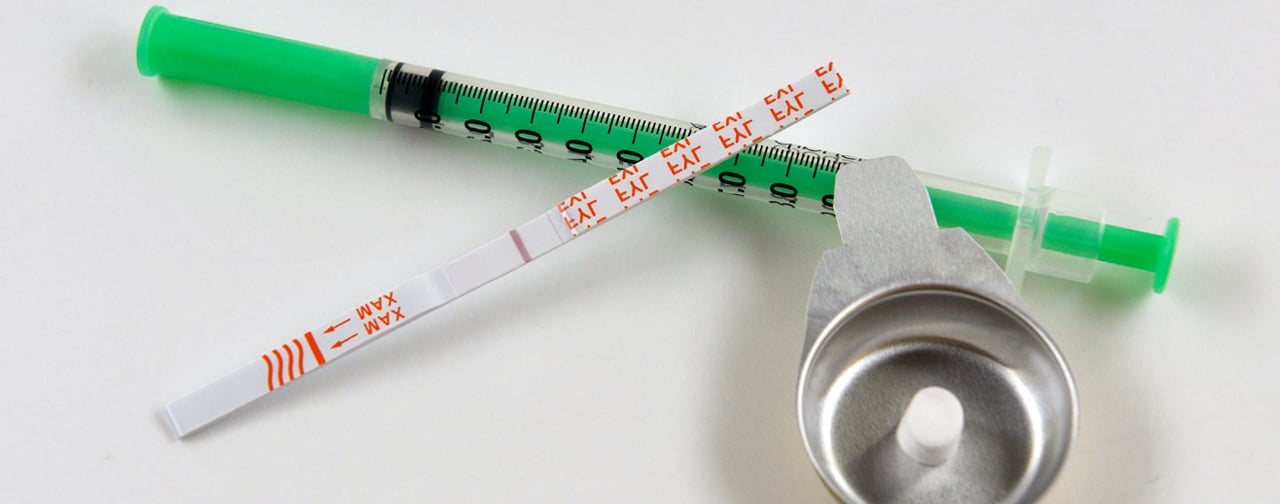
Negative fentanyl test strip. Credit: Anne Koerber/LSHTM
Care and prevent: skin infections and kidney disease
Promoting skin & soft tissue infection care and preventing AA amyloidosis among people who inject drugs in the UK.
To improve SSTI prevention, care and treatment interventions for PWID, including through assessing the feasibility of screening, diagnosis and treatment referral for AA-amyloidosis in UK drug treatment services.
This project is a Career Development Fellowship funded by the National Institute of Health Research. Dr. Madgalena Harris is the fellowship holder/principal investigator.
Recent updates
Events
Newsletter
Contact us
Address: 15-17 Tavistock Place, London
WC1H 9SH, United Kingdom
Phone: 02079272172
Skin and soft tissue infections (SSTI) are a significant cause of morbidity and mortality among people who inject drugs (PWID) in the UK. Complications associated with SSTI include sepsis, gangrene, endocarditis and AA amyloidosis; these can lead to limb amputation, kidney failure and death. Up to 60% of PWID in the UK report symptoms of recent or current SSTI, with 10% reporting SSTI-related hospital admissions per year. The majority of hospitalisations are avoidable, and are due to delays in primary care access. Despite the high individual and societal burden of injecting-related SSTI, it is a poorly understood and under-researched condition in the UK.
AA-amyloidosis is a serious sequela of chronic SSTI among PWID. Left untreated it can lead to kidney failure and premature mortality. Inequalities in outcome are pronounced: PWID median survival rate is 19 months compared to 52 months for all patients with AA-amyloidosis on haemodialysis in the UK. Symptoms of AA-amyloidosis can be subtle; kidney failure and death can occur prior to detection. This is a preventable and potentially reversible condition. Disease progression can be arrested with prompt and effective SSTI treatment alongside injecting cessation. AA-amyloidosis screening involves simple urinalysis, yet this has not been implemented in any UK drug treatment services.
Aim
To improve SSTI prevention, care and treatment interventions for PWID, including through assessing the feasibility of screening, diagnosis and treatment referral for AA-amyloidosis in UK drug treatment services.
Design and methods
This mixed-methods study comprises five interlinked phases:
- Phase 1. Determining the evidence base for SSTI interventions.
- Phase 2. Assessing feasibility of screening, diagnosis and treatment referral for AA-amyloidosis.
- Phase 3. Exploring, qualitatively, the AA-amyloidosis care pathway.
- Phase 4. Exploring, qualitatively, SSTI risk, protection and care.
- Phase 5. Developing information resources.
Implications of this study
This study has cost saving implications. SSTIs among PWID costs the NHS approximately £77 million annually. Intensive care admission is common, due to delay in primary care access. Timely provision of SSTI care can prevent hospital admissions. A San Francisco community wound clinic, informed by qualitative research, reduced SSTI-related hospital admissions by 35% and operating room procedures by 70%, saving US$9M in its first year. No data are available on the cost savings of early intervention for AA-amyloidosis, but this is likely to be significant: per-person dialysis costs are £31,000 annually. Cost effectiveness of screening depends on its impact on diagnostic and preventative care uptake and disease progression. As a feasibility study, phase 2 will provide data for initial calculations to take place – potentially informing a large collaborative study, with the aim of impacting national screening policy.
Funder
Recent updates
Events
Newsletter
Contact us
Address: 15-17 Tavistock Place, London
WC1H 9SH, United Kingdom
Phone: 02079272172
LSHTM Staff
Principal Investigator - Dr Magdalena Harris
Assistant Professor - Dr Catherine McGowan
Research Assistant - Talen Wright
Project mentors & collaborators
Professor Vivian Hope, Public Health England; Professor Dan Ciccarone, University of California, San Francisco; Dr Jenny Scott, University of Bath; Dr Gail Gilchrist, Kings College London; Professor Chris Bonell, London School of Hygiene & Tropical Medicine; , Dr Catherine McGowan, London School of Hygiene & Tropical Medicine; Dr Julian Gillmore, National Amyloidosis Centre; Dr John Dunn, Camden Drug Services; Kate O’Brien, Camden Drug Services; Dr David Bremner, Turning Point Drug Services
Recent updates
Events
Newsletter
Contact us
Address: 15-17 Tavistock Place, London
WC1H 9SH, United Kingdom
Phone: 02079272172
Recent updates
Events
Newsletter
Contact us
Address: 15-17 Tavistock Place, London
WC1H 9SH, United Kingdom
Phone: 02079272172
